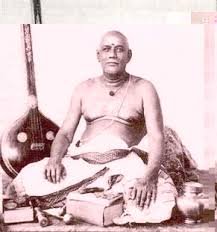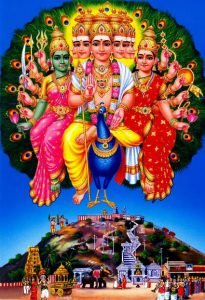శరవణభవ II పశుపతిప్రియ (Sharavanabhava II Pasupathipriya)
తాళం (Taalam): ఆది (Aadi)
స్వరకర్త (Composer): శ్రీ ముత్తయ్య భాగవతార్ గారు (Sri H.N. Muttayyah Bhaagavatar)
పాడిన వారు (Sung By): అరుణ సాయిరాం (Aruna Sairam)
పశుపతిప్రియ రాగంలో యాచన (ప్రార్థన) దేవునికి కుంకుమ, పసుపుకాంచన పూలు సమర్పించు నట్లని భావం.
Pasupathipriya, a rarely heard raagam is a Janya of Harikhamboji. Though the other Janya ragams of Harikhamboji are well known like Khamboji, Mohanam etc, this ragam has made very few appearances in the concert stage. It appears that Harikeshanallur Muttayyah Bhaagavatar is the only composer, credited with 4 kritis in this raagam.
HarikEshanallur Muttayyah Bhaagavatar – (1877-1945): He was a charismatic exponent of Harikatha as well as a seasoned punster. He was born on November 15, 1877 in Harikesanallur, a small village in the Tirunelveli district, in the late 19th century. The death of his father forced young Muttayyah to move from Punalveli to Harikesanallur, a village he made famous by affixing its name to his own. Muttayyah was sent to Tiruvaiyur by his uncle Lakshmana Suri to learn the sastras. But the atmosphere there was charged with the melodies of Carnatic music and soon Muttayyah found himself at the residence of Guru Sambasiva Iyer of the sishya parampara of Tyagaraja, to become a skilled musician. In 1904, Muttayyah shifted to Harikatha and made an indelible mark there. T. N. Seshagopalan, disciple of Ramanathapuram Sankara Sivam, who in turn was taught by Muttayyah Bhagavathar, says: “The most common reason cited for this shift is that his voice lost its timbre. But I prefer to look at the positive side. Bhagavatar had five attributes most essential for a Harikatha performer. He had knowledge of the sastras, was well-versed in music, had a captivating stage presence, could keep the audience enraptured and above all had a voice that could reach a large audience, so important in those mike-less days.”
Muttayyah Bhagavatar composed almost 400 musical forms, the largest among the post-Trinity composers. Tana varnams, Pada varnams, Daru varnams (his has been the first to come down to us), raagamaalikais, individual and group kritis (that include Navavarna, Navagraha, 108 songs each in praise of Siva and Chamundeswari apart from `stuti’ kirtanas), patriotic songs, Tillanas, and folk tunes. The songs were on a number of Hindu gods, his patrons, and in four languages – Telugu, Tamil, Sanskrit and Kannada. Almost 20 raagams owe their existence today to this great composer, including vijaysaraswathi, Hamsagamani, Karnaranjani, Budhamanohari, Niroshta and Hamsanandi. When someone asked if he could compose something that would appeal to Westerners, he composed the English notes made famous by Madurai Mani. He popularized shanmugapriyaa and mohana kalyaani. He was adept at playing both the chitravina and mrudangam. In addition to musical talents, his theoretical knowledge was also vast. He wrote a treatise on musical theory, Sangita Kalpa Drumam, and regularly gave lectures on musicology at the Music Academy.
He opened a music school called the Tyagaraja Sangita Vidyalaya in Madurai in 1920 on the lines of a gurukulam. Madurai Mani Iyer was one of its star disciples. He was also the first musician to be awarded a doctorate in India in 1943. He was also the first principal of the Swati Tirunal Academy of music started in Trivandrum in 1939. Muttayyah Bhagavatar has also authored a Sanskrit poetic work called “Tyagaraja Vijaya Kavya”. Seshagopalan says, “He was also the first to introduce the practice of nagaswara vidwans playing during the puja time at the Thiruvananthapuram temple. He was awarded the Sangita Kalanidhi title in 1930. Muttayyah Bhaagavatar died in June 30, 1945. The Harikesanjali Trust (promoted by his descendants) has been established to propagate his compositions. Mudra: HarikEsha
“శరవణభవ II పశుపతిప్రియ” వినుటకు , ► గుర్తు ఉన్న బొమ్మ మీద క్లిక్ చేయగలరు (Please click here to listen the “Sharavanabhava II Pasupathipriya”):

“శరవణభవ II పశుపతిప్రియ” (MP3) డౌన్లోడ్ చేసుకొనుటకు, ఈ దిగువ లింకు మీద క్లిక్ చేయండి (Please click here to download the “Sharavanabhava – Pasupathipriya” MP3): శరవణభవ II పశుపతిప్రియ (Sharavanabhava II Pasupathipriya)
పల్లవి:
శరవణభవ సమయమిదిరా సరగుణ నన్ను బ్రోవర
అనుపల్లవి:
పరమ పురుష పశుపతిప్రియ సుర సేవిత సుకుమార
చరణం:
చిరు నాథ నీ చింతన తోడను మరి మరి నీ మహిమ బల్కు
నాదు తరము దీర్ప తరుణమిదిరా హరికేశపుర అధినాయక
అర్థము – ఓ సుబ్రహ్మణ్యా, రెల్లుపొదల్లో పుట్టిన వాడా! ఇదియే నన్ను త్వరగా కాపాడటానికి తగిన సమయం. నీవు సమస్తమునకు అధినేతవు. నీవు మహాదేవుడికి ప్రియమైన వాడివి. నీవు నిత్యం దేవతలతో ఆరాధించబడే వాడివి. కోటి మన్మధుల సౌందర్య రూపము గలవాడా! నేను నా బాల్యం నుండి మీ గొప్ప శక్తులను ప్రశంసిస్తూ మీ మీద ధ్యానం చేస్తున్నాను. హరికేశాపుర యొక్క అధిపతి! ఇది నా ఆకాంక్షలను పూర్తి చేయడానికి సరైన సమయం.
****** Sharavanabhava II Pasupathipriya Lyrics ******
Pallavi:
Sahravababhava Samyamidira Saraguna nannu Brovara
Anupallavi:
Parama Purusha Pasupathipriya Sura Sevita Sukumara
Caranam:
Chiru Natha Ni Chintana Todanu Mari Mari nee Mahima Balku
Nadu Taramu deerpa Tarunamidira Harikeshapura Adinayaka
Meaning – Oh Lord Sharavana borne in reeds, this is appropriate time to protect me quickly. You are the Supreme Lord. You are dear to Lord Siva. Devatas adore you. You are handsome. I’ve been meditating upon you from my childhood onwards praising your great powers. Oh Lord of Harikesapura, this is the right time to fulfill my wishes.
మొబైల్ ద్వారా (Using Mobile):
Click on “More actions” (Top right corner “:” symbol) -> click on “Download”
లాప్టాప్ ద్వారా (Using Laptop):
Click on “Download” symbol.
****** సర్వం శ్రీవల్లీదేవసేనాసమేత శ్రీసుబ్రహ్మణ్యేశ్వరార్పణమస్తు ******
****** Sarvaṁ śrīvallīdēvasēnāsamēta śrīsubrahmaṇyēśvarārpaṇamastu ******
Mutayyaa Bhaagavatar:



Leave a Reply